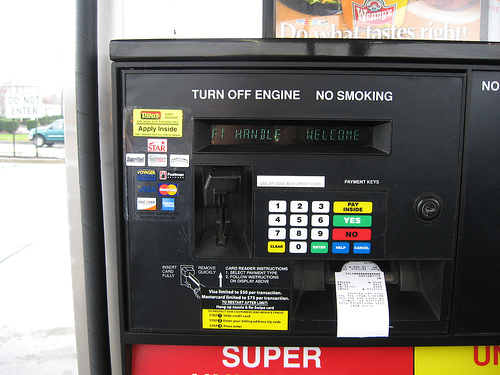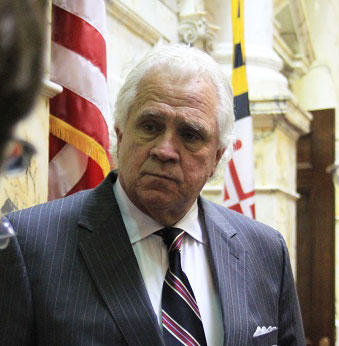Analysis: Tax-weary Assembly leery of gas tax hike
This is a slightly revised version of a column that appears in this month’s issue of The Business Monthly.
By Len Lazarick
A tax-weary legislature has no stomach to raise needed transportation revenues.
Everybody agrees that a good transportation network of roads, highways, bridges and mass transit are an essential underpinning of the Maryland economy. It’s been that way for two centuries — when Baltimore was, and still is, the closest seaport to the Midwest, as well as where the National Pike to the west begins, along with the first railroad line in the United States.
But there’s no agreement on how to pay for this transportation system in the 21st century. The port of Baltimore and BWI Thurgood Marshall Airport turn a profit, but mass transit continues to be a money-losing proposition and the funds to pay for highways are drying up.
Business groups, lawmakers and the governor know all this, and have been discussing it for six years and longer. But legislators were never enthused about a gasoline-tax hike. They rejected Gov. Martin O’Malley’s proposal six years ago for price indexing of the gasoline tax. A sales tax on gasoline he floated last year went nowhere.
This was at the time they were raising the sales tax by 20%, increasing income tax rates, hiking vehicle titling taxes, doubling the cigarette tax and raising the corporate income tax to the highest in the region. (The vehicle taxes and fees, and some of the new corporate taxes, went to transportation.)
A boatload of tax hikes
Since then, the legislature has raised income tax rates again, increased alcohol sales taxes by 50%, doubled the flush tax, taxed payments it makes to hospitals, doubled taxes on smokeless tobacco and cigars, raised recording taxes on special mortgages on commercial property, and doubled fees for birth and death certificates, as well as other government documents.
To the chagrin of legislators in affected communities, the Maryland Transportation Authority has also substantially raised tolls on bridges and tunnels. This will largely support not just maintenance but the building of new toll lanes on I-95, and help pay off the debt for the building of the Inter-County Connector from Laurel to Rockville (which has its own high tolls).
Just enumerating these taxes and fees makes it evident why legislators are weary of the plea for tax hikes, no matter how worthy the projects or goal. They also leery of the lure of “special funds” from taxes dedicated to special purposes.
Diverting special funds
Part of the real estate transfer tax which makes Maryland’s settlement costs among the highest in the nation are dedicated to purchase parks, forests and development rights on farmland. That money has been used for other purposes, and replaced with bonded debt, to be repaid with interest over 15 years, thus adding at least 20% to the total cost. Ditto the flush tax for the Bay Restoration Fund. This transfer of open space money will go on for another five years.
Money also has been shifted from the Transportation Trust Fund, though much of that has been repaid. That is not true of the $700 million in Highway User Revenues taken from the counties and municipalities. The governor’s chief of staff, Matt Gallagher, said they considered the funds used to maintain local roads and bridges as part of the local aid package.
O’Malley chose to increase school funding and reduce aid that had gone to public works, police and health departments. While all the “special funds” went into the big pot called the “general fund,” you can make the case that almost all the money diverted from other uses went to K–12 public schools and higher education.
As other states, such as nearby Virginia, cut funding to public colleges and universities (as Republican Gov. Bob Ehrlich had done in lean years), Maryland increased funding to public higher education, though not as much as it increased aid to public schools.
That’s the context for this session’s debate about transportation funding. There would be little debate at all, except for pressure from Senate President Mike Miller, who has been a strong, consistent advocate of increasing the gas tax.
This year, in SB830, Miller has proposed a new wrinkle: giving local jurisdictions the power to raise their own gas taxes for transportation. Kasemeyer is one of the co-sponsors.
Serious obstacles to Miller’s plan
Miller emphasizes that O’Malley and House Speaker Michael Busch need to get behind his plan or some alternative, but that has yet to happen.
Any increased funding for transportation faces serious political obstacles. Regardless of the arguments for more transportation revenues, the legislators are weary of taxes, and a Gonzales Research poll last month showed almost three-quarters of Maryland voters oppose a 10-cent gas tax hike.
Last month, at a briefing on the economy, senators asked Mark Zandi, the chief economist for Moody’s Economy, his opinion about raising the gas tax to fund infrastructure. “I would phase it in” over several years beginning in 2015, Zandi said, and “certainly not [raise it] in 2013.”
Zandi said the end of the 2% holiday on Social Security taxes was already a drag on the economy and will be difficult to absorb by lower-income residents. Even six-figure earners will see an extra $2,000 coming out of their paychecks.
The biggest problem with any fiddling with the gas tax is that it affects most households and businesses in the state and is seen as more regressive than even the sales tax, meaning it hurts lower income people more than those of higher incomes.
“I think it’s going to be difficult,” Howard County Sen. Ed Kasemeyer, chairman of the Budget and Tax Committee, told county officials in January. “We’ve waited too long,” with the last gas tax hike 20 years ago, and “now we’re stuck.”
Even a 10-cent-per-gallon increase “isn’t going to get what we need,” and “the public would probably scream,” Kasemeyer said. A 10-cent hike in the gas tax by itself raises about $300 million a year.
Need for a Lockbox
Given the way money for highways have been diverted in past years, many legislators and citizens say they will not support a gas tax hike without a guarantee that the money will only be used for transportation. This is called a “lockbox.” O’Malley said he is not opposed to this idea, but the only kind of lock on funding he has actually proposed is pretty easy to pick.
Miller has proposed a constitutional amendment requiring a vote by three-fifths of both houses to raid the transportation trust fund and divert its money to other programs.
Republicans and rural legislators also feel that the Mass Transit Administration, which runs the buses and subway in the Baltimore area, and the Washington Metropolitan Area Transit Authority, which runs the Washington bus and subway system, do not collect enough at the fare box, less than 30% of transit operating costs. Acting Transportation Secretary Darrell Mobley got an earful from budget committee members in recent weeks about the failure to meet even the 30% goal for farebox recovery mandated by state law.
Raising that figure to 50% would require substantial increases in fares for transit riders, who include many low-wage earners.
Despite the strong, constant backing by the Greater Baltimore Committee, the Maryland Chamber of Commerce and the Washington Board of Trade, few major businesses have actually come out in support of a gas tax hike. In fact, aside from business coalitions, about the only individual businesses that have supported the tax hike are contractors and subcontractors who would specifically benefit from increased spending on transportation. Businesses that heavily depend on trucking are strongly opposed to the increase.
Add all those factors together and the likelihood of higher taxes on gasoline seem remote this session. If some new revenues aren’t found for transportation, it will likely have to wait till after the 2014 election.

MarylandReporter.com is a daily news website produced by journalists committed to making state government as open, transparent, accountable and responsive as possible – in deed, not just in promise. We believe the people who pay for this government are entitled to have their money spent in an efficient and effective way, and that they are entitled to keep as much of their hard-earned dollars as they possibly can.


